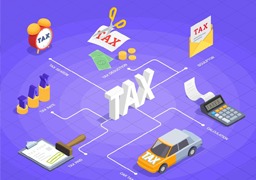# taxsystem
12 posts in `taxsystem` tag

How India's Income Tax Dept Uses AI to Monitor High-Value Transactions
India's Income Tax Department leverages AI and data analytics, including Project Insight and the Annual Information Statement (AIS), to monitor financial transactions, especially high-value ones. This blog explains how the system works, which transactions are watched, the implications for taxpayers, and how to ensure compliance in this new technological era.
.jpg)
Understanding Marginal Relief in Income Tax for Income Above 12 Lakh
This blog explores the Indian income tax system's marginal relief idea and explains how it helps taxpayers with earnings over 12 lakh. The blog illustrates how marginal relief lowers the tax due, guaranteeing equity and avoiding excessive tax increases, using the example of a 12,10,000 income. In order to demonstrate how this clause upholds a just and equitable tax system, the blog also provides instances of other income categories that are impacted by marginal relief.
.jpg)
Understanding Surcharges and Marginal Relief Under the Indian Tax System
This blog explains the complexity of income tax surcharges and marginal relief in India. It defines surcharges, their rates under both the old and new tax regimes, and the idea of marginal relief, which ensures high-income taxpayers are not unduly punished. It also offers taxpayers advice on how to properly manage their tax liabilities.
.jpg)
Big Relief for Taxpayers: CBIC Waives Late Fees for GSTR-9C Filing
Late costs for GSTR-9C files that were postponed from FY 2017–18 to FY 2022–23 have been forgiven by the Central Board of Indirect Taxes and Customs (CBIC). The 55th meeting of the GST Council accepted this plan, which permits taxpayers to file outstanding taxes by March 31, 2025, without incurring penalties. Businesses gain from the waiver because it promotes compliance, lessens financial strains, and streamlines the GST system. Discover its significance, qualifying requirements, and detailed application procedure in this extensive blog.
.jpg)
Government Clarifies Position on Capital Gains Tax Reforms
By declaring that no structural modifications to the capital gains tax system are under consideration, the government has reassured private investors and High Net Worth Individuals (HNIs). This ruling, which was announced on January 22, 2025, gives investors much-needed confidence and guarantees stability in India's tax system. The blog discusses the basics of capital gains tax, making a distinction between short-term capital gains (STCG) and long-term capital gains (LTCG), and stressing the significance of the government's resolve to preserve the current framework. Stability in tax policy, the maintenance of investment incentives, and increased market trust are important lessons learned that guarantee investors may smoothly organize their finances.
_1_11zon.png)
GST Exemptions Uncovered: Smart Ways to Save on Taxes
The tax system in India has undergone a radical change since the Goods and Services Tax (GST) was introduced in 2017. This thorough reference examines GST exemptions intended to assist vital industries, cut expenses, and advance public welfare. Learn about the various exemptions, their advantages, and how consumers and businesses may take use of them for everything from necessities like dairy and cereals to services in healthcare, education, and agriculture. Recognize the significant economic impact of these exclusions, learn to save more, and maintain compliance.

Taxpayer Relief: Significant CGST Section 16 Amendments for 2024
Taxpayers have benefited greatly from recent changes to CGST Section 16, which include extended ITC claim deadlines and unambiguous capital goods criteria. Exporters, SMEs, and lawful taxpayers gain from these adjustments, and the integrity of the system is maintained by stronger fraud protection measures. It is recommended that businesses become acquainted with these improvements in order to enhance compliance and capitalize on the increased availability of ITC.

Getting to Know India's Advance Tax System
This blog covers the fundamentals, advantages, and deadlines of India's advance tax system in great depth. It also provides advice on how to maintain tax law compliance and describes the repercussions of failing to pay advance tax. This tutorial will assist both individuals and businesses in comprehending and navigating India's complex tax structure.

Understanding the Difference Between Form 3CD and Form 49B
A thorough comparison of Forms 3CD and 49B, which are crucial records in the Indian income tax system, can be found in this blog. It assists taxpayers in understanding the importance of each form and guarantees that tax rules are followed by outlining its main functions, essential characteristics, and filing requirements.

Tax Guide for Senior Citizens: Forms & Returns for AY 2024-2025
This comprehensive guide explores the specific tax forms and returns applicable to senior citizens and super senior citizens in India for AY 2024-2025. From understanding exemption limits to maximizing deductions, elderly taxpayers can streamline their tax-filing process with expert insights and tailored advice.

Guide to Filing Income Tax Return (ITR) for New Taxpayers in India
This blog post provides a comprehensive guide for first-time taxpayers in India, covering the basics of ITR filing, types of ITR forms, documents required, and a step-by-step guide to filing taxes online and offline.

Understanding Section 206C: Tax Collected at Source (TCS) in India
Tax Collected at Source (TCS) under Section 206C of the Income Tax Act, 1961, is a crucial aspect of the Indian taxation system. This blog provides an in-depth look at TCS, detailing the specified goods and transactions, applicable rates, exemptions, compliance requirements, and recent amendments. By understanding these provisions, businesses can ensure compliance and avoid penalties. Stay informed about the latest updates and implications of non-compliance with this comprehensive guide.
